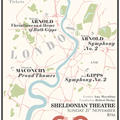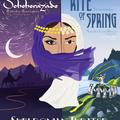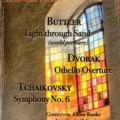2021-22
Sunday 21st November 2021, Sheldonian Theatre
Conducted by Robert Hodge
Led by Amy Moynihan
Arnold Symphony No.2
Gipps Symphony No.2
Arnold Variations on a Theme of Ruth Gipps
Maconchy Proud Thames
In Michaelmas 2021, OUO were joined by Robert Hodge as guest conductor for an evening centenary celebrations for 20th century composers. The concert was performed in the historic Sheldonian Theatre in the heart of Oxford on Sunday 21st November 2021 at 8pm
Our repertoire for this concert was a really exciting mix of lesser-known orchestral works. Malcolm Arnold and Ruth Gipps were contemporaries at the Royal College of Music and great friends so it is fitting to be performing their works together to mark the centenary of their births. Their respective second symphonies are gorgeous works which the orchestra loved rehearsing and sharing them with the audience. Arnold's Variations on a Theme by Ruth Gipps is a work that Hodge was keen to perform with OUO. This piece takes it's inspiration from Gipps' Coronation March 4 and features beautiful melodies from OUO's oboist and BBC Young Musician of the Year finalist: Ewan Millar.
To complete the concert, the orchestra featured Elizabeth Maconchy's Proud Thames overture, also written for the 1953 coronation. Despite scarce opportunities for female composers during her lifetime, Maconchy is considered to be "one of the finest composers the British Isles have produced". She also has strong links to Oxford, being elected an honorary fellow of St Hilda's College in 1978, the same college at which her daughter Nicola LeFanu (also an accomplished composer) studied.
We were very excited to exhibit multiple, excellent works by female composers in this concert and we would like to thank the Ambache Trust for their support with performing these. We would also like to thank the Malcolm Arnold Trust for their support in performing his works.
A review of this concert can be found here:
OUO MT21 Concert review (oums.co.uk)
Checkie Hamilton reviews the OUO concert held on the 21st of November 2021.
This term’s OUO concert promised an ambitious programme of four lesser-known works, with two pieces composed by women and the entire programme written by composers born post-1900. The room was packed to the gunnels despite a glimpse of the phrase “avant-garde” in the programme notes, two words more at home in a sparsely attended back-end concert hall than Sir Christopher Wren’s Sheldonian Theatre.
The concert began with Elizabeth Maconchy’s Proud Thames Overture, a work which won a competition to be the Coronation Overture for the new Queen of England in 1953. It opened with a well-controlled trumpet announcement, followed by bubbling woodwind, evoking the mouth of the great river. Despite the significant additions of orchestration throughout the piece, the essence of the Thames River was never lost due to the repetition of ascending and descending thirds throughout the movement which created a sense of development as the river flowed through the piece. The final rendition of this motif echoed the grandeur and depth of the Thames in its majestic performance on the timpani.
This was followed by Ruth Gipps’ Symphony No.2. While this work is a one movement symphony, it is split into eight different sections with distinctly contrasting moods which were brilliantly conveyed by the orchestra, from the nationalist, military fourth section to the lyrical violin solo that opened the seventh section. The programme notes described how the work displayed the influence of her teacher and mentor Vaughan Williams and this was evident in the second section with a folk-like, pastoral violin melody, brilliantly performed by Amy Moynihan.
Malcolm Arnold’s Variations on a Theme by Ruth Gipps created an effective segue into the second half of the concert. The main theme, a pastoral oboe solo was capably played by Ewan Millar at the beginning of the work and could be heard in various contexts throughout the piece from an excitable trumpet and string rendition in the first variation to an urgent pizzicato string version in the fourth variation. The variations were bookended by another rendition of the theme on the oboe in the sixth and final variation.
The final work, Malcolm Arnold’s Symphony No.2, was a particularly impressive end to the concert. The programme notes told that ‘Arnold’s life was one notoriously pervaded by alcoholism, severe depression, and suicide attempts, and the interpretative distance from his biography to the music of the third movement is short.’ This was certainly conveyed in this performance with the sul ponticello violins creating a harsh and unsettling sound and augmented intervals in the woodwind giving a sense of being suspended between tonalities. The tolling of a tubular bell was effective in evoking a sense of impending death. After hearing the third movement of this work, it was hard to believe that the same tormented composer could have written the following, final movement. A cymbal crash launched us into the fourth movement, followed by a cheeky, energetic clarinet solo brilliantly performed by James Garagnon. There were some issues with the string ensemble in the final movement, but this was a minor flaw in an exceptionally well-performed programme.
Friday 11th February 2022, Sheldonian Theatre
Conducted by Natalia Luis-Bassa for her first concert since being appointed as OUO's inaugural Principal Guest Conductor
Featuring Violetta Suvini (Violin)
Led by Amy Moynihan
Stravinsky Rite of Spring
Rimsky-Korsakov Sheherazade
A review of this concert can be found here:
Rite of Spring and Scheherazade: OUO Concert review (oums.co.uk)
Checkie Hamilton offers her take on OUO’s Hilary Term concert, conducted by Natalia Luis-Bassa and featuring Stravinsky’s Rite of Spring and Rimsky-Korsakov’s Scheherazade.
With Russia currently at the forefront of the headlines, it felt prescient that this term’s OUO concert presented an all-Russian programme. Unlike last term’s concert which showcased lesser-known works, predominantly by female composers, this term OUO opted for familiar, although challenging pieces, performing Stravinsky’s riotous ballet, The Rite of Spring, followed by Rimsky-Korsakov’s symphonic suite, Scheherazade.
The choice to perform familiar repertoire perhaps added an element of pressure to do justice to well-loved works and this would certainly have been felt by Will Kidner who was tasked with opening the concert with the iconic bassoon solo that kicks off Stravinsky’s pagan ritual. This haunting folk tune was capably delivered, although perhaps a little quietly. This seemed to set the tone for the work which although demonstrating a virtuosic mastery of complex rhythms, was slightly deficient in drama and effect. There were moments of brilliant string ensemble, notably in the opening movement with unity in the unexpected accents. Natalia Luis-Bassa kept the orchestra under control with understated, rhythmic conducting. Furthermore, the work places a spotlight on the wind section, and impressive solos were heard throughout, in particular from the E flat clarinet and the alto flute. There were moments of ensemble issues, for example in the Sacrificial Dance and there were instances in which tuning was neglected, particularly amongst the horns. Given the number of covid-related absences and last-minute replacements across various sections of the orchestra this was an impressive performance of a very challenging piece.
The second half of the concert transported us to the Middle East for Rimsky-Korsakov’s take on The Tale of Arabian Nights, Scheherazade. The indulgent string melodies and lyrical figures stood in distinct contrast to The Rite and its unpredictability. The orchestra seemed to finally capture its dramatic potential in this half of the concert with effective evocations of Arabian scenes and a sense of the exciting tales recounted to the Sultan by Scheherazade. The work began by the lower brass introducing the Sultan’s theme with gusto, proceeded by the Sultana Scheherazade’s much more tender theme, effortlessly performed by Violetta Suvini on the solo violin. In their own rendition of the Sultan’s theme, the violins lacked clarity in the ornamentation. There were impressive, controlled clarinet solos throughout the work, performed by Katherine Lewington, in particular the scalic figures in the third movement. A phenomenally rapid flute solo was excellently performed by Annabel Liu in the final movement. The concert came to a serene finish as Scheherazade is finally lulled to sleep by an exquisite high tessitura violin solo.
Friday 20th May 2022, Sheldonian Theatre
Conducted by Chloe Rooke, the first to take part in our Early Career Conductors scheme
Led by Aoife Soni
Tchaikovsky Symphony No.6
Dvorak Othello Overture
Sam Buttler Light Through Sand (World premiere)
On Friday 20th May at 8pm, the Orchestra performed Tchaikovsky's Sixth Symphony, Dvorak's Othello Overture and the world premiere of Light Through Sand by Sam Buttler at the historic Sheldonian Theatre in the heart of Oxford. OUO were under the baton of alumna Chloe Rooke for her OUO debut. Chloe graduated from Oxford in 2018 where she played with OUO and conducted the Wind Orchestra for 2 years. She is now an accomplished professional conductor taking up engagements worldwide; we were thrilled to welcome her back to Oxford.







